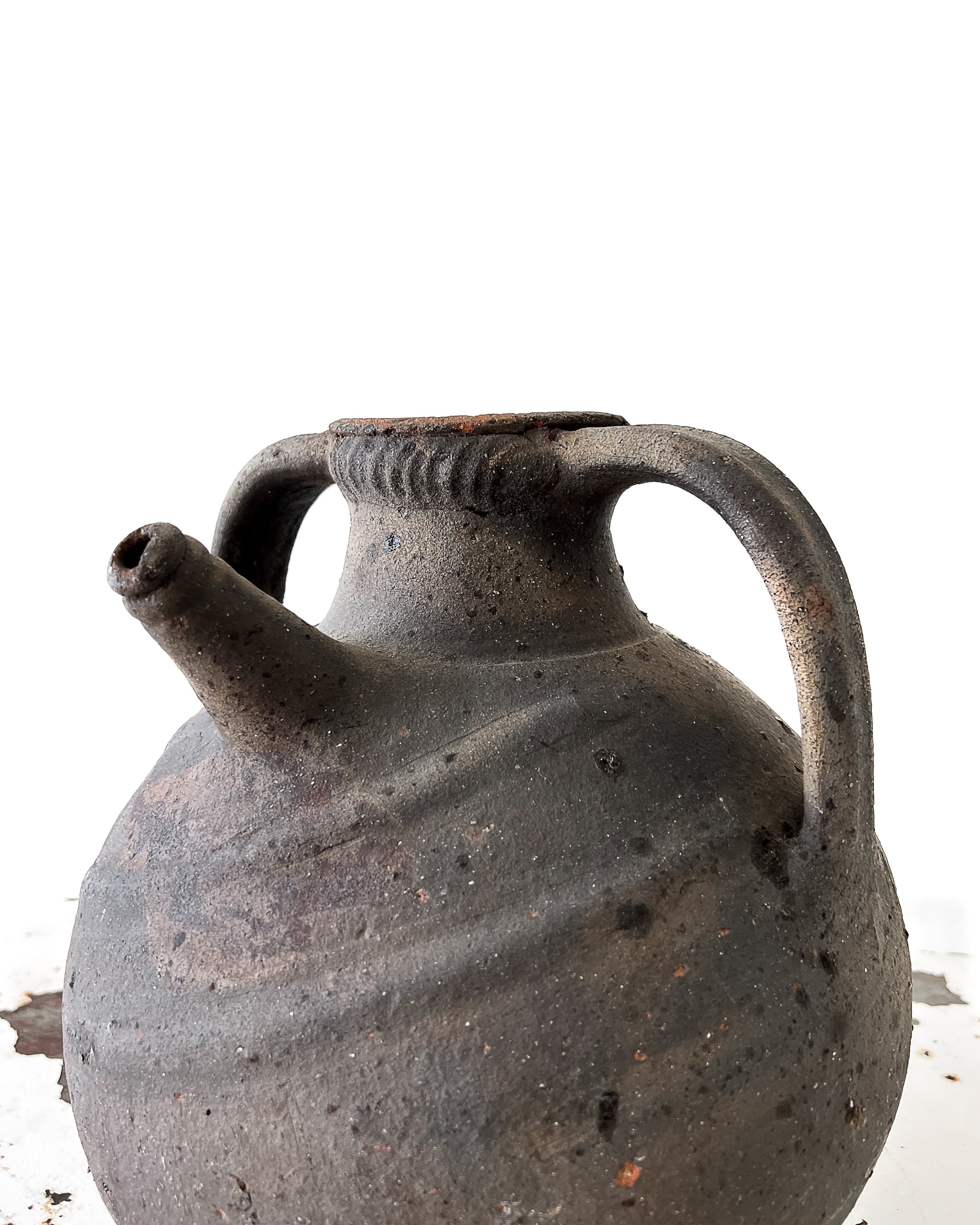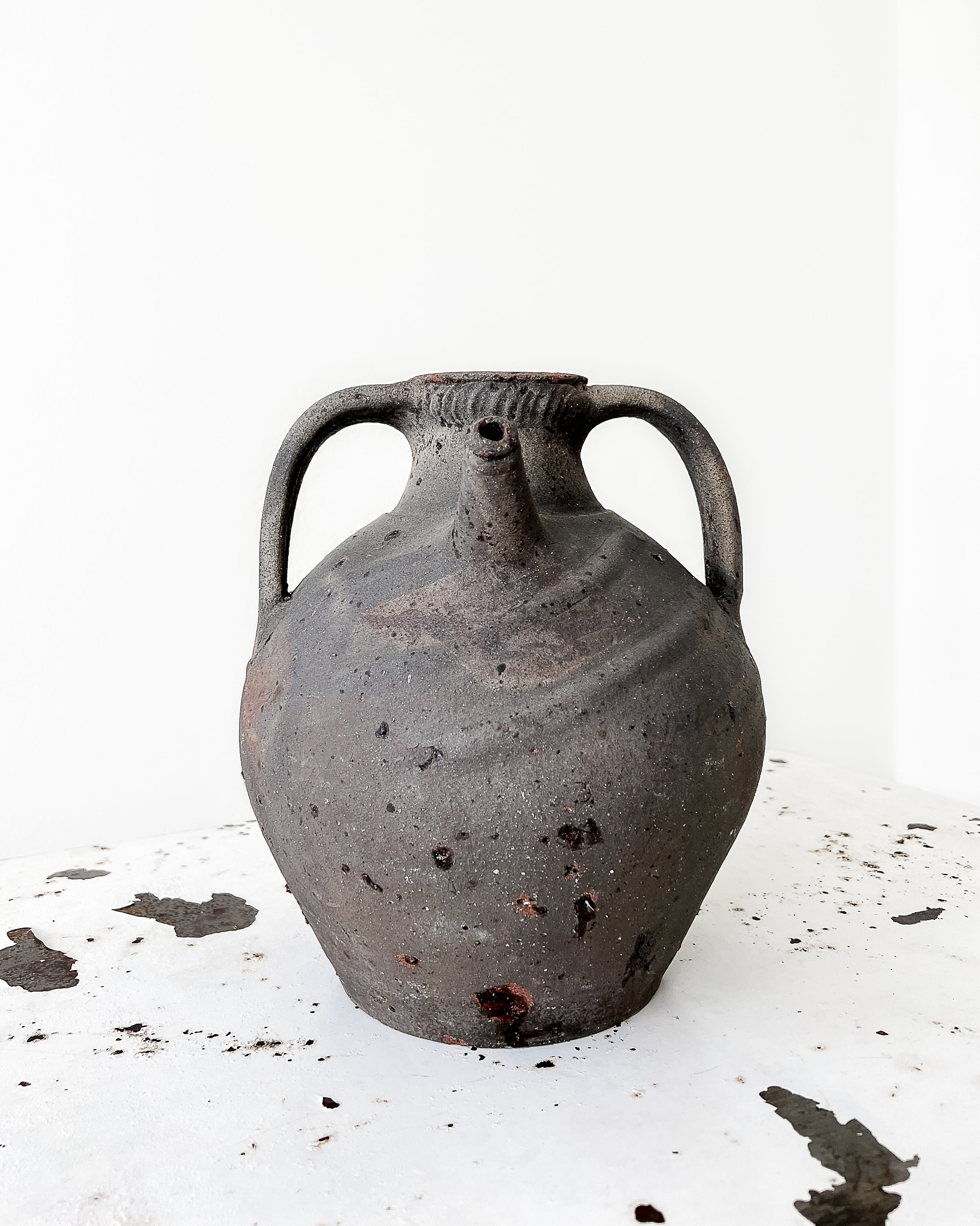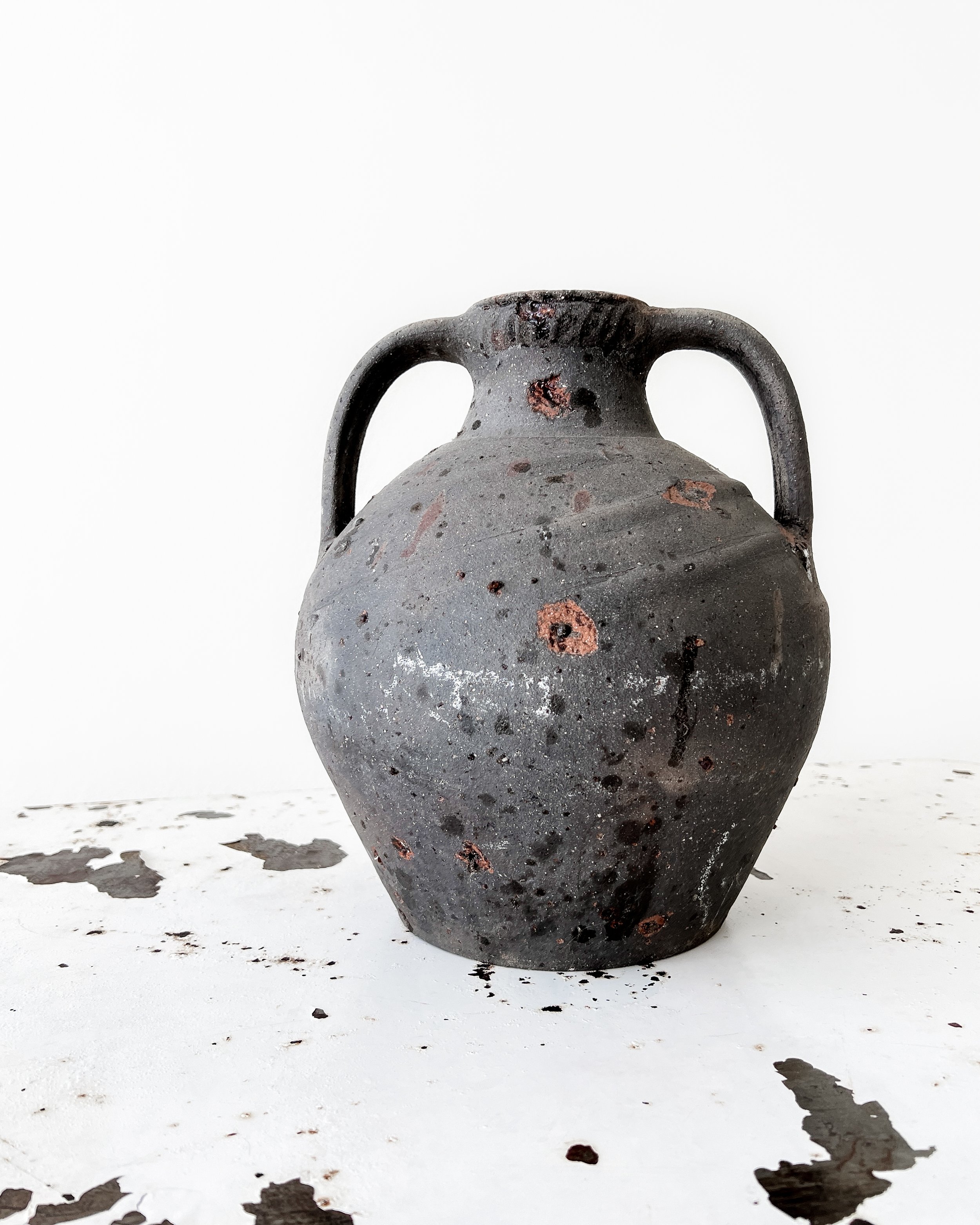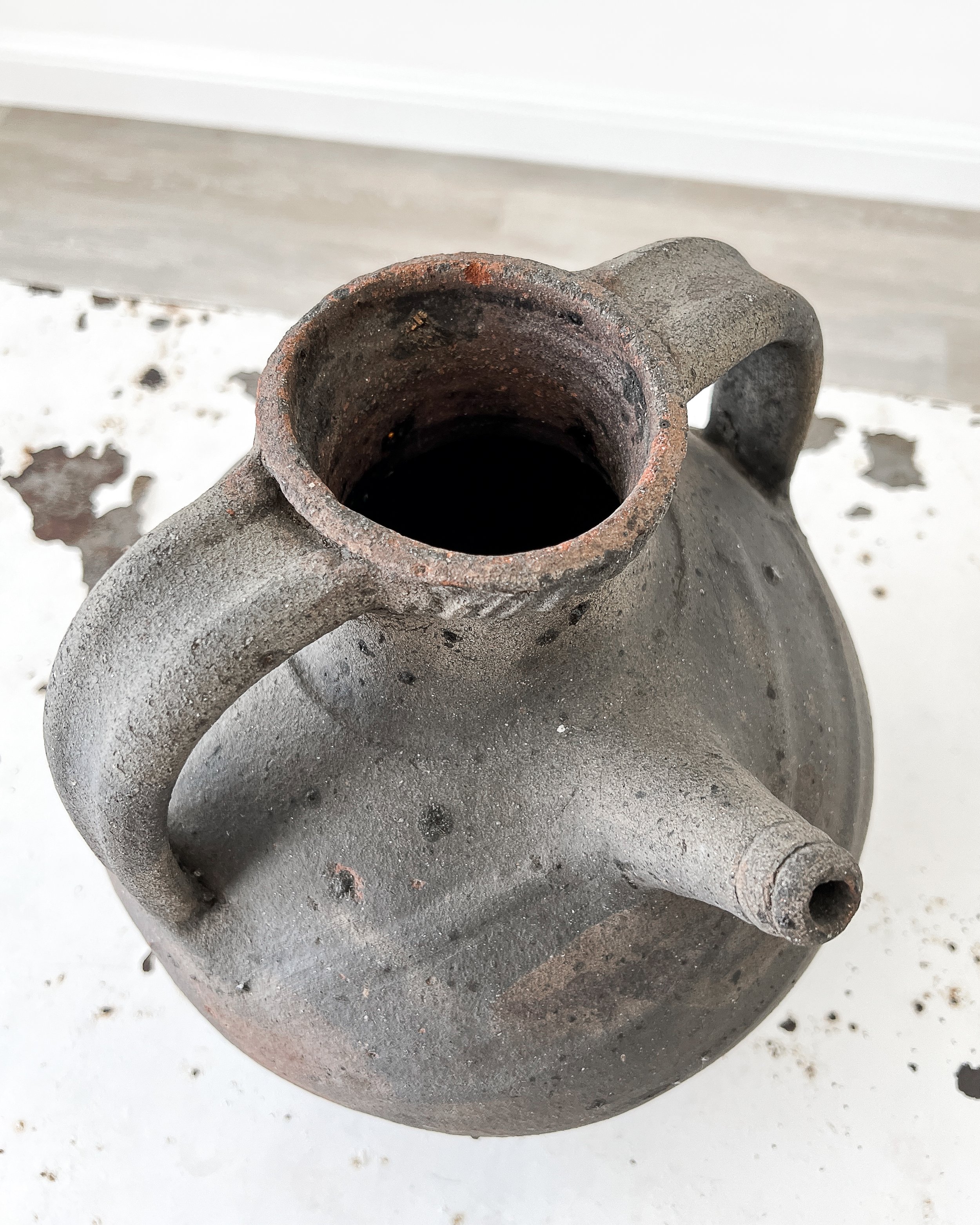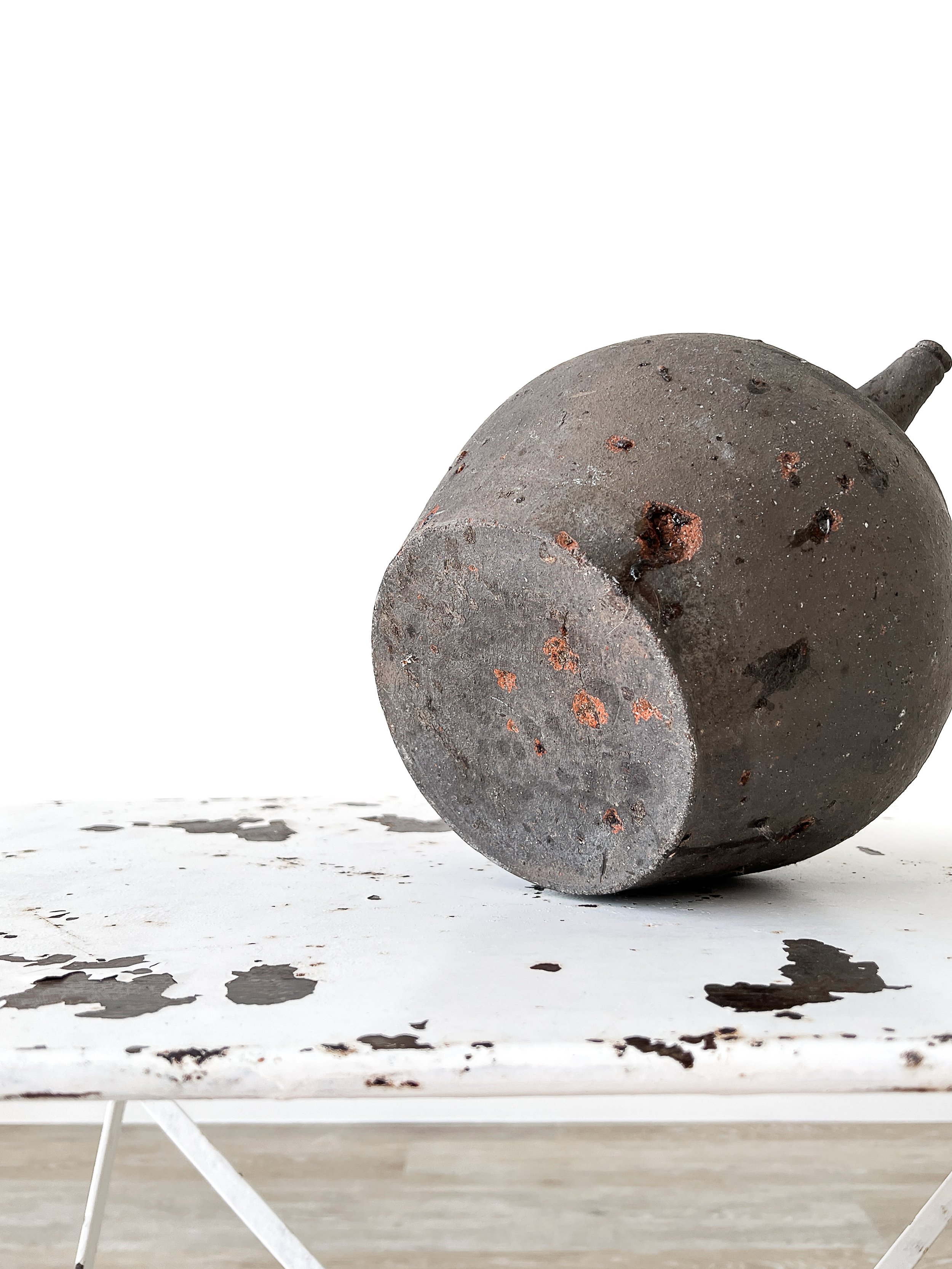Antique French Walnut Oil Jug, Charcoal Gray
A utilitarian vessel used for storing walnut oil in the south of France in its former life, this primitive one-of-a-kind jug is now a work of art meant to be showcased. Having two handles and a pouring spout, the jug is hand-crafted from terracotta and bears a matte charcoal gray glaze. Its rustic form and time-worn patina make it a beautiful decorative addition to any room in the home.
History of Walnut Oil: historical evidence shows that walnuts originated in Persia and were first cultivated by the Greeks. Brought into the rest of Europe by the Romans, walnuts became highly regarded in France, where they began cultivating them in the 14th century. It takes nearly four pounds of walnuts to press a single quart of walnut oil. Known for its wide variety of uses such as food, medicinal purposes, fuel for oil lamps, and dye for hair, wool and cloth, one of the lesser known uses for walnut oil was its employment in the embalming process of Egyptian mummies. European artists even preferred the use of walnut oil to mix with pigments for use in paintings, and chemical analysis confirms the use of walnut oil in the French impressionist paintings of Monet, Cezanne and Pissaro.
Found in France, circa 1790
Jug is hand-thrown and has a slightly irregular shape
Features character marks, crazing, and some slight discoloration
A few chipped areas (not structural) are present, adding to its character
Remnants of oil residue that has leached over time is present
Overall signs of wear consistent with age and use
Measures approximately 10 1/2” W diameter (at widest point) x 12 1/4” H
Opening measures 3” W
Available for pick up, local delivery, and nationwide shipping.
Need help with an item? Email Us
Request a trade discount here.
A utilitarian vessel used for storing walnut oil in the south of France in its former life, this primitive one-of-a-kind jug is now a work of art meant to be showcased. Having two handles and a pouring spout, the jug is hand-crafted from terracotta and bears a matte charcoal gray glaze. Its rustic form and time-worn patina make it a beautiful decorative addition to any room in the home.
History of Walnut Oil: historical evidence shows that walnuts originated in Persia and were first cultivated by the Greeks. Brought into the rest of Europe by the Romans, walnuts became highly regarded in France, where they began cultivating them in the 14th century. It takes nearly four pounds of walnuts to press a single quart of walnut oil. Known for its wide variety of uses such as food, medicinal purposes, fuel for oil lamps, and dye for hair, wool and cloth, one of the lesser known uses for walnut oil was its employment in the embalming process of Egyptian mummies. European artists even preferred the use of walnut oil to mix with pigments for use in paintings, and chemical analysis confirms the use of walnut oil in the French impressionist paintings of Monet, Cezanne and Pissaro.
Found in France, circa 1790
Jug is hand-thrown and has a slightly irregular shape
Features character marks, crazing, and some slight discoloration
A few chipped areas (not structural) are present, adding to its character
Remnants of oil residue that has leached over time is present
Overall signs of wear consistent with age and use
Measures approximately 10 1/2” W diameter (at widest point) x 12 1/4” H
Opening measures 3” W
Available for pick up, local delivery, and nationwide shipping.
Need help with an item? Email Us
Request a trade discount here.
A utilitarian vessel used for storing walnut oil in the south of France in its former life, this primitive one-of-a-kind jug is now a work of art meant to be showcased. Having two handles and a pouring spout, the jug is hand-crafted from terracotta and bears a matte charcoal gray glaze. Its rustic form and time-worn patina make it a beautiful decorative addition to any room in the home.
History of Walnut Oil: historical evidence shows that walnuts originated in Persia and were first cultivated by the Greeks. Brought into the rest of Europe by the Romans, walnuts became highly regarded in France, where they began cultivating them in the 14th century. It takes nearly four pounds of walnuts to press a single quart of walnut oil. Known for its wide variety of uses such as food, medicinal purposes, fuel for oil lamps, and dye for hair, wool and cloth, one of the lesser known uses for walnut oil was its employment in the embalming process of Egyptian mummies. European artists even preferred the use of walnut oil to mix with pigments for use in paintings, and chemical analysis confirms the use of walnut oil in the French impressionist paintings of Monet, Cezanne and Pissaro.
Found in France, circa 1790
Jug is hand-thrown and has a slightly irregular shape
Features character marks, crazing, and some slight discoloration
A few chipped areas (not structural) are present, adding to its character
Remnants of oil residue that has leached over time is present
Overall signs of wear consistent with age and use
Measures approximately 10 1/2” W diameter (at widest point) x 12 1/4” H
Opening measures 3” W
Available for pick up, local delivery, and nationwide shipping.
Need help with an item? Email Us
Request a trade discount here.




